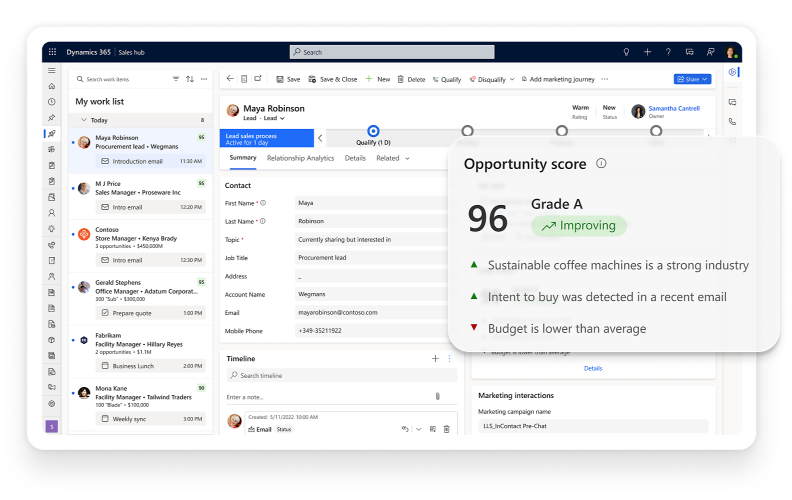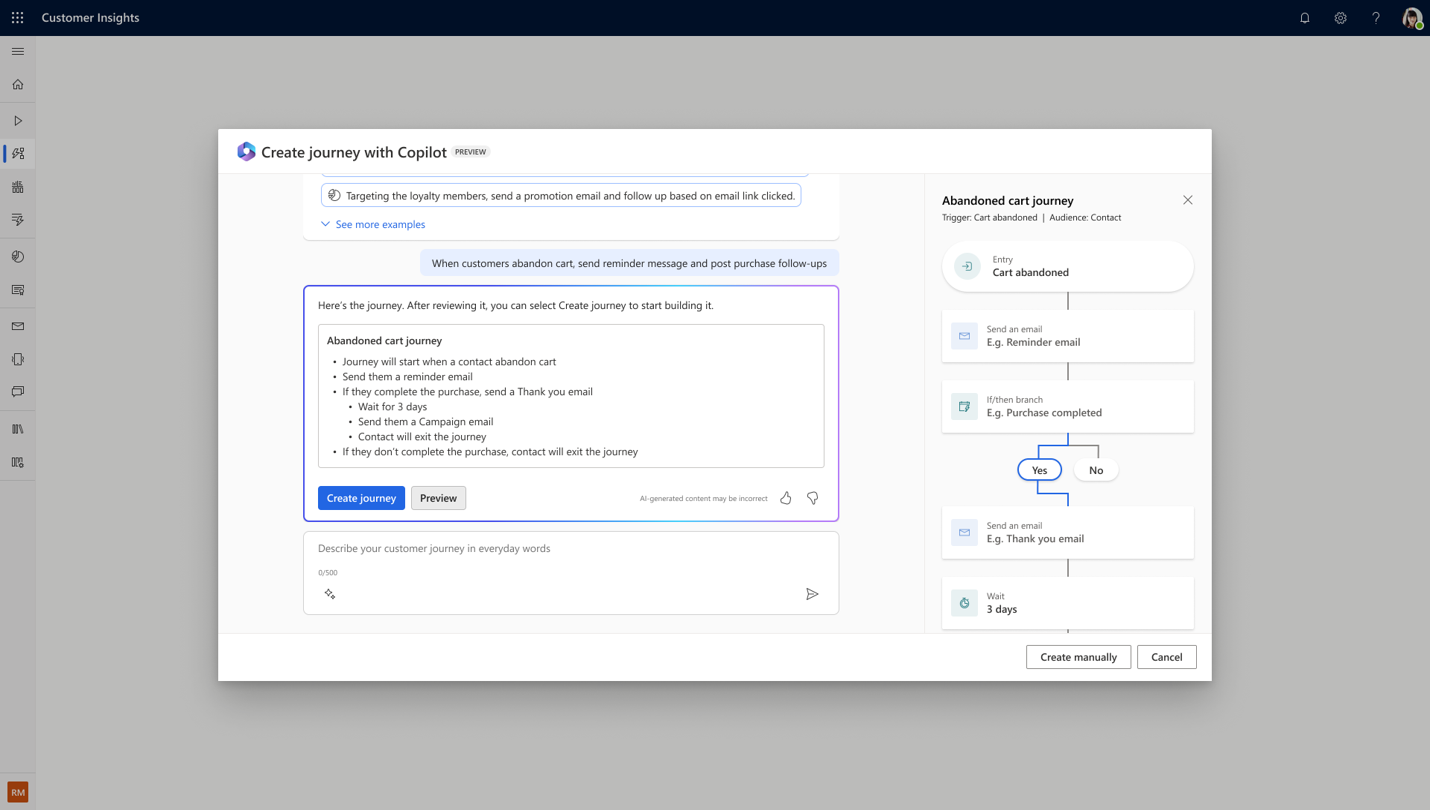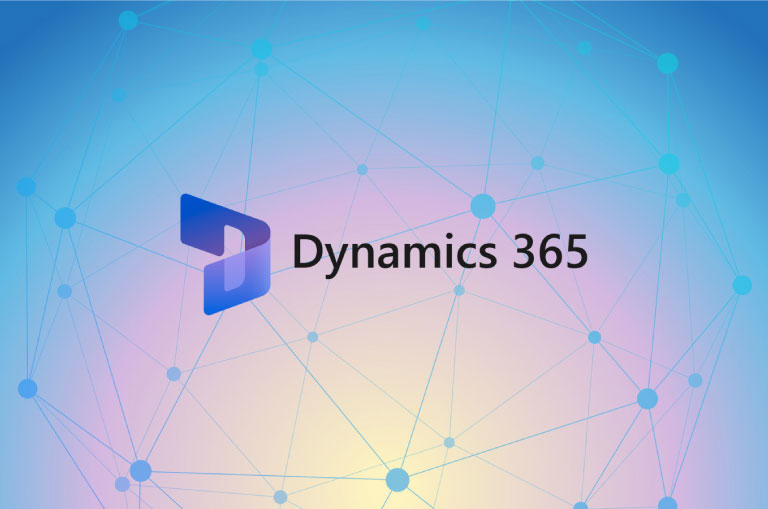Microsoft Dynamics 365 Customer Insights
Reach your potential customers and drive [Business growth] with Microsoft Dynamics 365 Marketing, empowering personalised campaigns and data-driven strategies.
What is Dynamics 365 Customer Insights and Why Does it Matter?
A versatile platform designed to transform your marketing strategies and customer engagement.
It unifies customer data, automates marketing campaigns, and delivers AI-driven insights that enhance decision-making and campaign effectiveness.
With Dynamics 365 Customer Insights for Marketing, businesses can create personalised experiences, boost customer loyalty, and drive measurable growth.
Scalability
Easily scale your applications up or down based on demand, without the need for significant upfront investments.
Security
Benefit from Microsoft's robust security measures to protect your data and applications from threats.
Global Reach
Deploy your applications worldwide and reach customers in any region.
Cost-Efficiency
Pay only for the resources you use, reducing overall IT costs.
Focus On Business Growth, Not On Technical Issues
Scalability
Easily scale your applications up or down based on demand, without the need for significant upfront investments.
Security
Benefit from Microsoft's robust security measures to protect your data and applications from threats.
Global Reach
Deploy your applications worldwide and reach customers in any region.
Cost-Efficiency
Pay only for the resources you use, reducing overall IT costs.
Main Dynamics 365 Marketing Features
Unlock the potential of your marketing team with these powerful tools
Customer Journey
Automate and personalise customer journeys across multiple channels.
Email Marketing
Create, send, and track email campaigns with advanced analytics.
Lead Scoring
Automatically score and prioritise leads to focus on high-potential opportunities.
Event Management
Plan and manage online and in-person events seamlessly.
Marketing Analytics
Gain insights into campaign performance with detailed analytics.
Social Media Integration
Manage, schedule, and analyse social media activity in one place.
Dynamics 365 Customer Insights for Marketing
Unlock the tools and insights your business needs to excel in every stage of the marketing journey.

Automate Customer Journeys
Businesses can create and automate personalised customer journeys across multiple channels. Dynamics 365 Marketing allows users to map out every touchpoint, ensuring consistent and relevant communication throughout the customer lifecycle, from awareness to purchase and beyond.
Manage Email Campaigns
With Dynamics 365 Marketing, businesses can design, send, and monitor email campaigns with ease. The platform provides customisable templates, segmentation tools, and detailed analytics to measure the effectiveness of each campaign, helping to refine future efforts.
Score and Prioritise Leads
Automatically score leads based on their engagement and behaviour. Dynamics 365 Marketing helps businesses identify the most promising prospects, allowing sales and marketing teams to focus their efforts where they’ll have the most impact.
Plan and Manage Events
Businesses can efficiently plan, promote, and manage both online and in-person events using Dynamics 365 Marketing. The platform tracks registrations, manages logistics, and automates follow-up communications, ensuring a seamless event experience for attendees.
Manage Marketing Content
Dynamics 365 Marketing enables businesses to create, store, and manage a library of marketing content. From social media posts to landing pages, users can centralise their assets, making it easier to maintain brand consistency across all channels.
Analyse Campaign Performance
The platform offers advanced analytics and reporting tools to track the success of marketing campaigns. Businesses can gain insights into customer engagement, measure ROI, and identify areas for improvement, allowing for data-driven marketing strategies.
Engage with Social Media
Manage and monitor social media campaigns directly within Dynamics 365 Marketing. Businesses can schedule posts, track engagement, and analyse social media performance, ensuring their brand remains active and responsive across all platforms.
Collaborate Across Teams
Dynamics 365 Marketing facilitates collaboration between marketing, sales, and other departments. Users can share insights, coordinate campaigns, and work together on customer journeys, ensuring a unified approach to customer engagement.
Need help with project delivery?
Your [Tech] Team Awaits
Working with
ARP Ideas Experts
Working with
ARP Ideas Experts
We don’t believe in a one-size-fits-all approach. Our services are custom-crafted to meet the unique needs of your business.
As your trusted Microsoft Partner, we prioritise clear, straightforward communication, ensuring our conversations are always focused and meaningful.
Our commitment is to collaboration, enhancing your company’s capabilities and driving tangible business results.


Related Microsoft products
Discover additional applications to enhance your business with the tools you need
Microsoft
Copilot
Leverage AI-driven assistance to automate tasks, enhance productivity
Dynamics 365
Sales
Create targeted campaigns, nurture leads, and drive business growth.
Dynamics 365
Customer Service
Resolve issues, track interactions, and increase customer satisfaction.
Powered by Microsoft AI Copilot
Experience AI-driven insights, automated tasks, and predictive analytics to help your team make smarter decisions and close deals faster.

Dynamics 365 Customer Insights FAQ
Find answers to common questions and learn more about how we can support your business.
Microsoft transitioned from Dynamics 365 Marketing to Dynamics 365 Customer Insights to reflect the broader capabilities of the platform. While marketing remains a core function, the platform now offers a comprehensive view of the customer, encompassing data from various sources and enabling more personalized customer experiences. The new name emphasizes the platform's ability to provide deep insights into customer behavior and preferences.
Articles & Resources
Discover valuable insights, guides, and expert advice to support your business growth.



